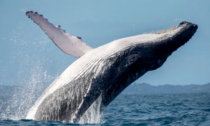
Seeing dolphins and whales in the sea enjoying their natural environment is a dream for most animal lovers. But a new report by MPs has found some marine wildlife is being failed by the UK government. Protections for these species are poorer compared to other countries, the Environment, Food and Rural Affairs Committee (Efra) found. Some of the threats to these animals includes underwater noise, pollution in the water and climate change.
But these creatures play a key role in maintaining a healthy ecosystem and help support economies which rely on coastal tourism.
The findings come as government efforts to scale up climate action have been described as “worryingly slow” by government watchdog, the Climate Change Committee.
Politicians on the Efra committee have suggested the UK should encourage countries they have trade deals with to stop killing marine mammals.
Countries such as Iceland, Japan and the Faroe Islands have hunted whales and dolphins, with supporters of this saying it’s a sustainable way of gathering food from nature and an important part of their cultural identity.
“We can and should do more to stop this as we sign new post-Brexit trade deals worldwide,” Sir Robert Goodwill, the Conservative MP who is head of the committee, told the Guardian.
Another threat outlined in the report is to do with bycatch – which is when animals are caught in fishing operations targeting other species.
“Snaring these beautiful creatures in fishing gear wreaks a far greater toll. We must stop this industrial-scale killing. We owe it to our generations to come,” Sir Robert says.
A recommendation by MPs suggested better monitoring of this, with past reports suggesting about 650,000 marine mammals are killed this way globally, each year.
“This throws into stark contrast this country’s proud track record of standing up for whales and dolphins around the world,” says Chris Butler-Stroud, chief executive of Whale and Dolphin Conservation.
He gave evidence to the committee for the report and says “it’s not too late to put things right”.
There is also a call from MPs for better laws, with criticism over current protections being weak compared to other countries.
The UK’s grey seal population is not included in the section of the Wildlife and Countryside Act, which bans the intentional killing, injuring or taking of species, and stops their possession or trade.
MPs have said the seals – of which there are around 120,000 in the country – should be added to this list as soon as possible.
In response, a spokeswoman from the Department for Environment Food and Rural Affairs said recommendations from the report would be considered.
“The UK has a strong track record in marine conservation and places great importance on ensuring that appropriate protection and management is in place for marine mammals.”
She added the government had shown its commitment through initiatives such as the Marine Wildlife Bycatch Mitigation Initiative which “outlines how the UK will achieve its ambitions to minimise and, where possible, eliminate the bycatch of sensitive marine species”.
Chris added his wildlife charity supported the call for better laws to address issues.
“It would close the loopholes exposed by the Efra committee’s report, remove the inconsistencies in our legislation, stop UK ports being used to sustain the hunting of whales and dolphins, and make this country a beacon for whale and dolphin protection,” he added.










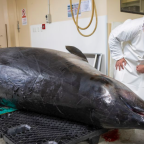
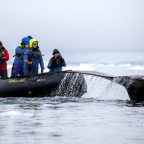
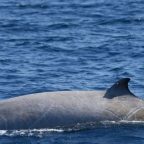
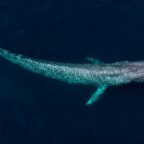

Social Profiles